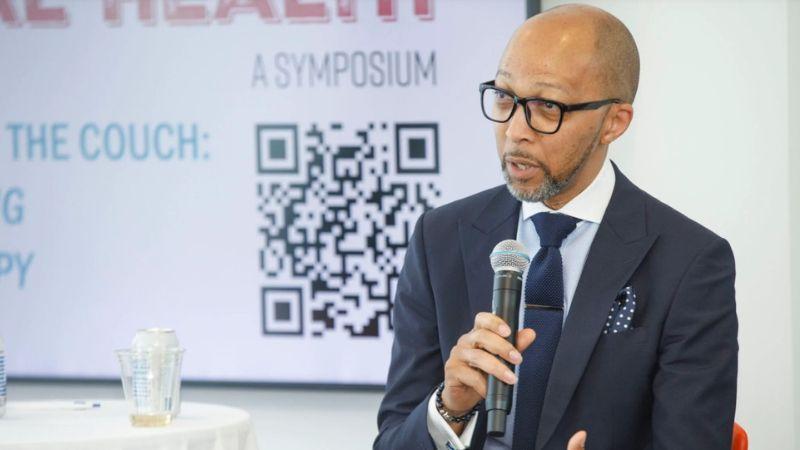Senior Lecturer in Social Sciences at the University of Westminster Bryan Bonaparte attended a day-long symposium at Harvard University to discuss solutions to the mental health crisis affecting both younger and adult Black males.

The symposium was organised by the Hutchins Center for African & African American Research, which supports research on the history and culture of people of African descent and provides a forum for collaboration and the ongoing exchange of ideas. It brought together an expert panel of academics, authors, psychiatrists, journalists and more to discuss and come up with solutions to the issues facing Black men.
Part of the day focused particularly on ‘the talk’, which is the term to describe the conversations that happen among Black families to prepare children, especially the boys, for interactions with the police. The panel also covered the impact of societal racial bias on self-esteem and identity.
Those who attended the event were split into one of three discussion groups. Bonaparte formed part of the second panel, which explored both the stigma Black men often feel is associated with seeking support for their mental health and the lack of representation in therapy that is available to them. The panel discussed the various ways to encourage more Black men to engage in therapy and psychological support, including ensuring that they can access psychotherapy that understands and is sensitive to their lived experiences. The discussion also covered how the sessions themselves should look, with suggestions that trauma-informed approaches that make the participant feel safe and empowered will help them be more receptive to support.
Bonaparte also commented on the fact that religion sometimes does not provide enough of a support network for Black men who need mental health support. As quoted in The Harvard Gazette, Bonaparte said: “I was raised Christian, but I see that the church/religion — in whatever way you want to describe it — while being seen as a sanctuary, it can also be a stick to beat yourself with. If you’re not doing things in the way that the church wants you to, or you think the church wants you to, then there’s no other way.”
Bonaparte continued: “Just go and pray is often the response that you get. Do not go and seek someone who has a medical or science degree, because you’re not going to get your answers from a book, unless it’s The good book. You’re going to get your answers from up there.”
In his research, Bonaparte looks at masculinity and how the social construction and ideology often provide a toxic playbook of how men, particularly ethnically marginalised men, should navigate their life journey.
Reflecting on the symposium, Bonaparte said: “It was a privilege to be invited to Harvard to talk on Black Men and their Mental Health. It shows that the subject matter is global and reaches the higher echelons of the educational establishment. Which I hope bodes well for the future as this discourse needs to continue.”
This collaboration directly contributes to the United Nations Sustainable Development Goals (SDG) 3: Good Health and Wellbeing, 10: Reduced Inequalities and 17: Partnerships for Goals. Since 2019, the University of Westminster has used the SDGs holistically to frame strategic decisions to help students and colleagues fulfil their potential and contribute to a more sustainable, equitable and healthier society.
Find out more about Equality, Diversity and Inclusion at the University of Westminster.
Find out more about studying on the Psychology BSc Honours course at the University of Westminster.


